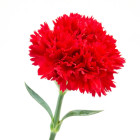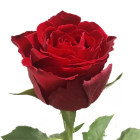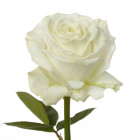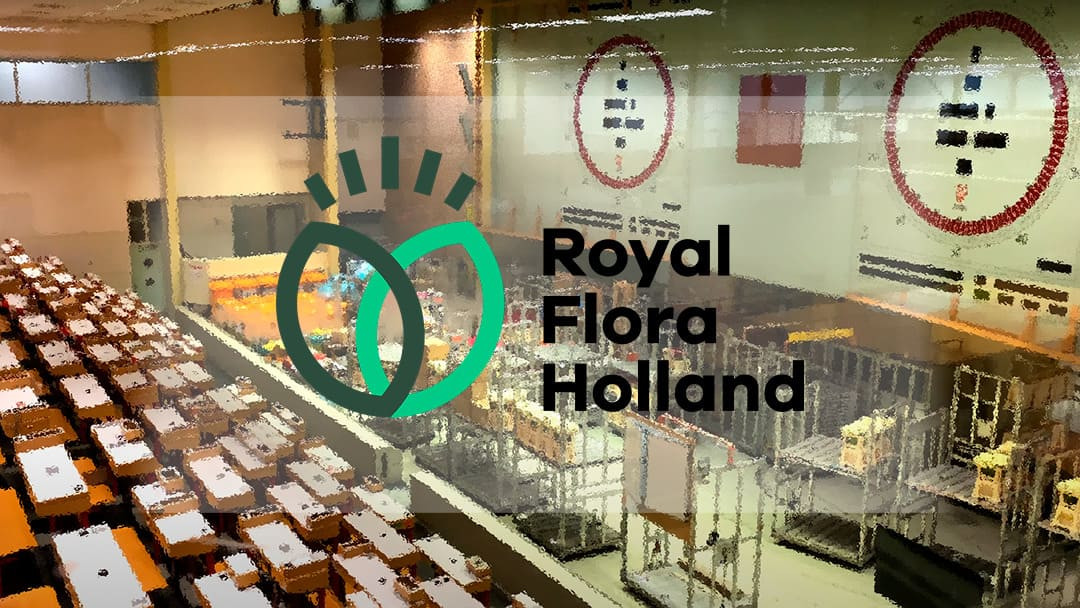
What is FloraHolland Flower Auction?
Flower auctions play a key role in international flower trade, providing a centralized platform for buying and selling a vast array of floral products. These auctions bridge the gap between flower growers and buyers, optimizing the trade process and ensuring product freshness. One of the most significant of these auctions is Royal FloraHolland, which not only sets flower prices globally but also promotes sustainable development in the floral industry.
The FloraHolland auction system is based on the reverse auction principle, where the starting price decreases until someone places a bid. This method ensures fair pricing and speeds up the sales process. Millions of flowers and plants are sold daily at FloraHolland auctions, making it a crucial component of the global flower supply chain.
A Brief Overview of the History of Flower Auctions and Their Evolution
The history of flower auctions began in the early 20th century. The first auction was organized in the Netherlands in 1912 by a group of flower growers aiming to achieve better prices by uniting their efforts. These auctions evolved and grew, becoming more structured and professional over time.
A key milestone in history was the integration of auctions under Royal FloraHolland, formed through numerous mergers, becoming the largest auction company in the world.
Today, FloraHolland continues to evolve, implementing digital technologies and innovative solutions. In 2017, the Floriday platform was launched, unifying all digital transactions and logistical processes, keeping the auction competitive and efficient in the modern economy.
Thus, flower auctions, particularly FloraHolland, are crucial for global flower trade, providing stable and transparent pricing mechanisms, supporting industry sustainability, and fostering international cooperation between growers and buyers.
The History and Formation of FloraHolland
Foundation and Development
The FloraHolland flower auction traces its origins back to 1912, when a group of Dutch flower growers united to create the first cooperative auction. Their goal was clear: to centralize sales to achieve better prices for their products. The first auction was organized in Aalsmeer, a small town near Amsterdam. From the outset, the auction proved to be an efficient trading method for flowers, leading to its rapid growth and development.
Key Stages of Development and Major Events, Including Mergers and Rebranding
Throughout its existence, FloraHolland has undergone many significant stages and transformations. One key event was the integration of several major auction houses. In 1968, the merger of two leading Aalsmeer flower auctions spurred the creation of the world's largest flower trading center. Another major event occurred in 2008 when the largest flower auctions in Naaldwijk, Rijnsburg, and Eelde merged under the FloraHolland brand.
The 2011 rebranding, when the auction received royal status and became known as Royal FloraHolland, highlighted its significance and influence on an international level. This recognition not only bolstered the auction's reputation but also contributed to its continued growth and development.
The Role of the Auction in Establishing the Netherlands as a World Leader in Flower Exports
Royal FloraHolland has played a decisive role in transforming the Netherlands into the world's flower trading center. Thanks to its extensive infrastructure and innovative technologies, the auction has become a vital link in the global flower supply chain. Every day, vast quantities of floral products pass through its platforms, allowing the Netherlands to maintain a leading position in the global market.
The auction has not only boosted exports but also supported small and medium-sized growers by providing them with access to international markets. Today, over 60% of the world's flower trade goes through Dutch auctions, with a significant portion conducted through Royal FloraHolland.
Thus, the history and development of FloraHolland reflect significant changes in the global floral industry, confirming the auction's role as a central element in global flower trade and strengthening the Netherlands' position as a leading flower exporter.
FloraHolland's Operational Processes
Auction Processes
FloraHolland's operational processes represent a complex and well-organized system, starting with the receipt of flowers from suppliers and ending with their sale at auction. Every day, millions of flowers and plants from around the world are delivered to the auction. The process begins with flowers being delivered to the auction, where they undergo initial quality checks and sorting.
After receiving and sorting, the flowers are stored in specially equipped cold storage rooms to maintain their freshness until the moment of sale. These rooms maintain a temperature between 5 and 8 degrees Celsius, preventing premature blooming and extending shelf life.
Auction Clock System and Its Operation Principle
One of FloraHolland's key features is the auction clock system used for selling floral products. The auction clock operates on a reverse auction principle. The starting price of a product is set high, and it gradually decreases until a buyer stops the clock, agreeing to the current price. This method enables quick and efficient trading, ensuring fair pricing.
The auction clock displays all necessary product information, including type, quantity, quality, producer name, and other characteristics. Buyers, either in the hall or connected remotely, see this information on large screens and can promptly make purchasing decisions.
Transition to Digital Auctions
Over time, FloraHolland has actively implemented digital technologies to improve its operational processes. In the 1990s, the transition from analog to digital auction clocks began, speeding up the auction process and making it more transparent and convenient for participants.
In 2017, a digital platform was launched, integrating all processes related to auctions, logistics, and financial settlements. This platform consolidated all operations into a single digital ecosystem, simplifying the flower buying and selling process for all market participants. Now buyers can place bids and complete transactions remotely using their computers and mobile devices, making the auction more accessible and efficient. This is what the digital platform Flora Market strives for.
Thus, FloraHolland's operational processes encompass the entire cycle from flower receipt and storage to their sale through a modern and high-tech auction clock system. This process is continually improved through digital technology implementation, keeping the auction competitive and in demand in the global market.
Logistics and Transportation
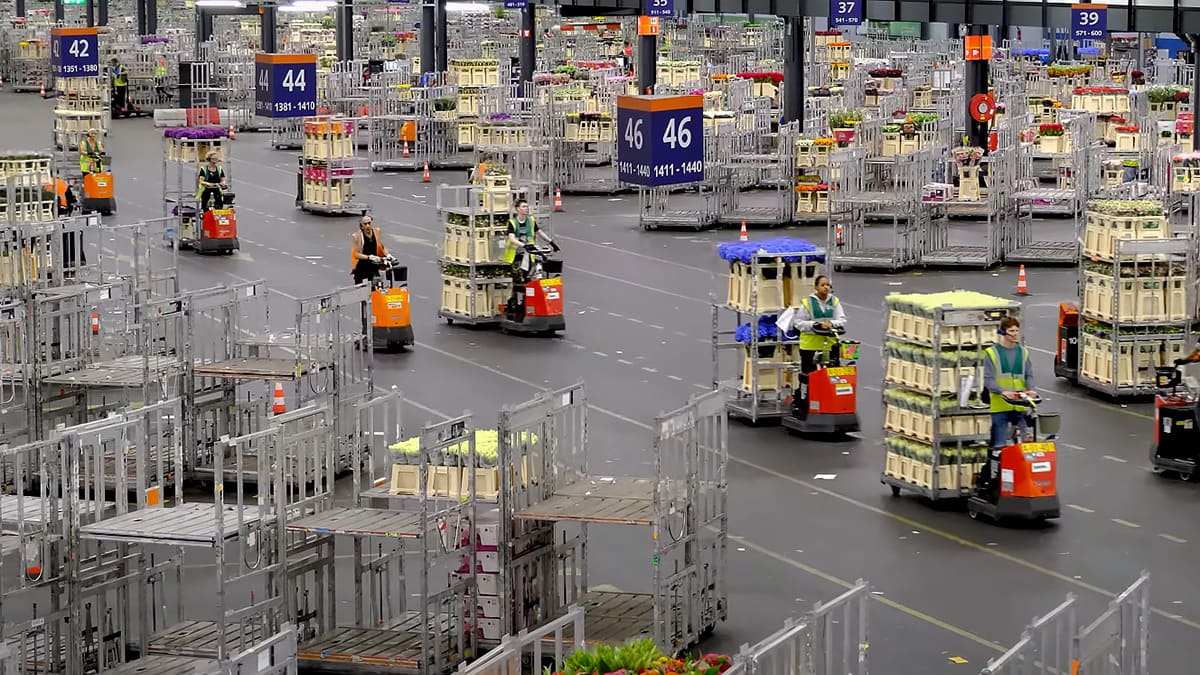
The Role of Logistics in Flower Freshness and Quality
Logistics and transportation play a key role in FloraHolland's operations, ensuring the freshness and quality of flowers from the moment they arrive until they reach buyers. Flowers come to the auction from thousands of suppliers worldwide, and each step in the logistics chain is carefully planned to minimize time and preserve product quality.
Key stages of the logistics process include:
- Reception. Flowers arrive at the auction, where they undergo initial quality checks and sorting.
- Storage. After reception, flowers are placed in cold storage rooms maintaining optimal temperatures of 5 to 8 degrees Celsius, preserving freshness and preventing premature blooming.
- Preparation for auction. Flowers are sorted and placed on special auction carts, then delivered to auction halls.
- Delivery to buyers. After the sale, flowers are quickly distributed and shipped to buyers. This process is carefully coordinated to minimize delivery time and maintain high product quality.
Features of Flower Storage and Transportation
To ensure high quality and freshness, FloraHolland uses specialized storage and transportation methods:
- Cold storage. Temperature-controlled storage is critical. FloraHolland's cold storage facilities are among the largest globally, ensuring optimal conditions for flower freshness.
- Specialized transport vehicles. Flowers are transported in temperature-controlled vehicles, such as refrigerated trucks or containers, maintaining constant temperatures from the auction to the buyer.
- Rapid order processing. After the auction, flowers move quickly to distribution halls, where they are sorted by buyer orders. The entire process is automated and managed by computer systems to minimize processing time.
- Global logistics. FloraHolland collaborates with logistics companies and airlines to ensure fast flower delivery worldwide. Flowers from countries like Kenya and Ecuador are flown to the Netherlands for customs clearance and distribution.
- Careful packaging: Flowers are packed in special containers and boxes that protect them from damage during transportation. Packaging also includes moisture-retaining materials to prevent drying out.
These measures enable FloraHolland to maintain high standards of quality and freshness, ensuring reliability and customer satisfaction globally. FloraHolland's logistics processes exemplify efficient supply chain management in the floral industry.
FloraHolland's Impact and Significance in Global Flower Trade
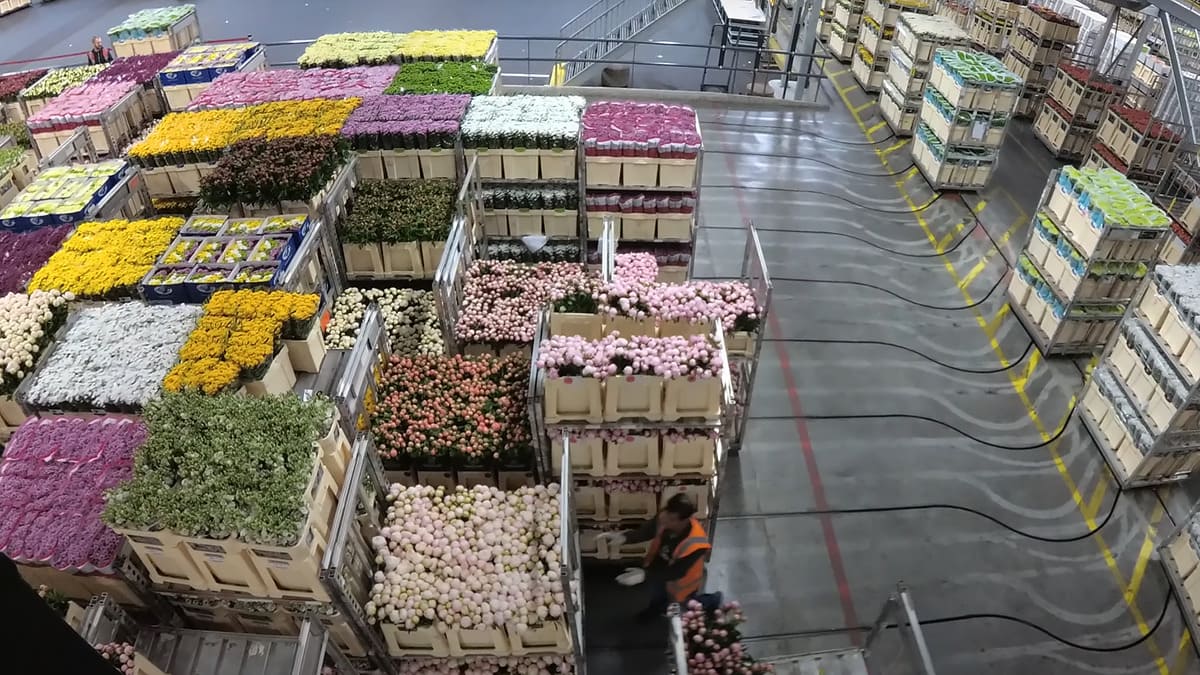
Scale and Volume
Royal FloraHolland is the largest flower auction in the world, playing a pivotal role in global flower trade. The scale of FloraHolland's operations is impressive: over 30 million flowers and plants pass through its platforms daily. In 2023, FloraHolland processed about 43 million transactions, underscoring its market significance.
In 2023, FloraHolland's sales volume was 5.11 billion euros, demonstrating stability and market importance despite a 1% decrease from the previous year. The cooperative had 3266 members, and the variety of traded flowers and plants exceeded 23,000.
FloraHolland's Export and Import Markets
FloraHolland operates internationally, linking flower producers from various countries with buyers worldwide. In 2023, the largest export markets were Germany (1.709 billion euros), the UK (993 million euros), France (786 million euros), Italy (360 million euros), and Poland (351 million euros), highlighting the importance of European markets.
Import markets are also crucial for FloraHolland's success. In 2023, the largest flower importers were Kenya (406 million euros), Ethiopia (216 million euros), Israel (58 million euros), Belgium (50 million euros), and Germany (38 million euros). This underscores FloraHolland's global reach and ability to connect producers and buyers worldwide.
Economic Significance
FloraHolland has a significant impact on the Dutch economy and the global flower industry. The Netherlands has long been considered a leading center for world flower exports, and FloraHolland plays a key role in maintaining this reputation. The floral sector creates numerous jobs and contributes to the country's economic growth. In 2023, the auction turnover was 455 million euros, which is 2% higher than in 2022 despite general economic challenges.
FloraHolland also significantly contributes to the development of small and medium-sized businesses in the floriculture sector. The auction provides small producers with access to international markets, allowing them to compete on equal terms with large players. Thanks to the FloraHolland platform, small producers can sell their products at fair prices, which contributes to their sustainable development and growth.
Thus, FloraHolland is not only the largest flower auction in the world but also plays a key role in the economic development of the Netherlands and the global flower industry. Its large-scale operations, significant trade volumes, and support for small and medium-sized businesses make it an indispensable element in the global flower supply chain.
Current Challenges and Prospects
Market and Competitiveness
In modern conditions, FloraHolland faces several significant challenges that require adaptation and innovation to remain competitive internationally. One of the main challenges is growing international competition from new, cheaper flower producers from Africa, South America, and Asia. These regions offer lower production costs and, thanks to improved logistics, can supply their products to global markets faster and cheaper.
Market digitization is a significant challenge for FloraHolland. The emergence of online platforms has radically changed how producers and buyers interact. FloraHolland, striving to maintain its leading positions, implements advanced digital technologies that integrate all aspects of auction trading, logistics, and financial settlements. These innovations not only increase efficiency and transparency of operations but also set a high standard for other platforms, such as Flora Market, which also deals with flower trading and logistics for wholesale companies, flower shops, and event organizers in various countries worldwide.
Strategies for Adaptation and Innovation in Auction Operations
To overcome current challenges, FloraHolland has developed several adaptation and innovation strategies:
- Integration of digital technologies, including online auctions, electronic catalogs, and order management systems.
- Logistics optimization. Implementation of modern logistics solutions such as automated warehouse and transportation management systems.
- Development of new markets. FloraHolland actively works on expanding its presence in new markets, including Eastern Europe and Asia, which allows diversifying revenue streams and reducing dependence on traditional markets.
Stability and Sustainable Development
Sustainable development is one of the key principles of FloraHolland's activities. In the context of growing attention to environmental and sustainable development issues, the auction takes active measures to minimize its environmental footprint and support sustainable floriculture.
- FloraHolland implements various initiatives to reduce CO2 emissions, including the use of renewable energy sources and optimization of logistics processes. For example, a significant portion of transportation is carried out using electric vehicles, which helps reduce carbon emissions.
- The auction collaborates with producers to ensure their products meet high sustainability standards. This includes the use of environmentally friendly growing methods, minimizing the use of chemical fertilizers and pesticides, and ensuring fair working conditions for workers.
- FloraHolland actively works on ensuring supply chain transparency, allowing buyers to trace the path of flowers from producer to end consumer. This contributes to increased product trust and strengthens the auction's reputation.
Thus, FloraHolland successfully adapts to current challenges and continues to innovate to maintain its competitiveness and sustainable development. These measures allow the auction to retain leading positions in the global market and make a significant contribution to the development of the global flower industry.
Conclusion
The Role of FloraHolland in the Future
FloraHolland continues to play a vital role in the global flower trade, remaining a central link in the international supply chain. In the future, the auction plans to strengthen its position through the implementation of advanced technologies, improving logistics processes, and expanding into new markets.
Prospects for the Auction's Development and Its Role in Global Flower Trade
The development prospects of FloraHolland are associated with several key directions:
- Technological Innovations: The introduction of new digital solutions, such as improved auction systems and platforms for remote participation, will allow the auction to increase its efficiency and attract new customers.
- Sustainable Development: Continued efforts to reduce the environmental footprint and support sustainable flower production methods will help strengthen the auction's reputation and attract eco-conscious customers.
- Global Expansion: Expanding its presence in new markets, including developing countries, will create additional growth opportunities and diversify the business.
These steps will allow FloraHolland not only to maintain its current positions but also to significantly strengthen its influence on the international arena.
Final Thoughts on the Importance of the Auction for the Industry and Global Economy
FloraHolland is an integral part of the global flower industry. The auction ensures fair pricing, high product quality, and transparency in trading processes, which contributes to the development of the flower business worldwide. Thanks to its large-scale infrastructure and innovative solutions, FloraHolland remains a leading player in the market, supporting the Dutch economy and contributing to the sustainable development of global flower trade.
Appendices and Additional Materials
Key Dates in FloraHolland's History:
- 1912: The founding of the first flower auctions in the Netherlands.
- 1968: Merger of auctions in Aalsmeer, creating the largest flower trade center.
- 2008: Formation of FloraHolland through the merger of auctions in Naaldwijk, Rijnsburg, and Eelde.
- 2011: Receiving royal status and renaming to Royal FloraHolland.
- 2017: Launch of a digital platform to improve trading process management.
- 2023: FloraHolland's turnover reaches 5.111 billion euros, confirming its market leadership.
These historical milestones demonstrate FloraHolland's long development path and its contribution to shaping the modern flower industry.




